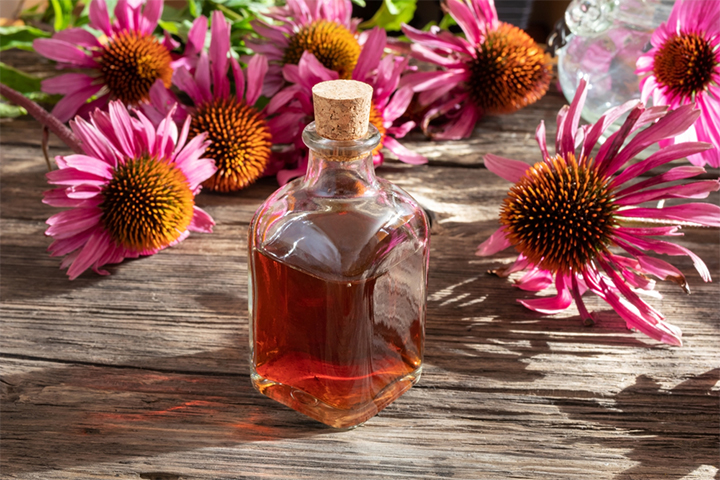Echinacea is the name of a species of flowering plant belonging to the daisy group and is known to have medicinal value (1). If you plan to use Echinacea while breastfeeding, read the post for more information. The leaves and roots of the Echinacea plants are used for medicinal purposes as plant-based remedies. It is a common herbal ingredient in cold, flu, skin infections, and inflammation medicines. Read on for more information on Echinacea, its uses, benefits, safety during breastfeeding, and side effects.
Is It Safe To Have Echinacea While Breastfeeding?
There is little scientific data about the safety and efficacy of echinacea during lactation. Yet, its use under expert guidance in recommended doses is not considered harmful while nursing (2). There is limited evidence to suggest that compounds found in echinacea pass into or alter breast milk composition.
Echinacea is available as traditional and natural medicine products like herbal tea, juice, extracts, capsules, and tablets, and dietary botanical supplements. If you want to use any of these echinacea preparations or products while nursing, then you should do so only after consultation with an expert in herbal medicine. They can guide you about the safe mode of use and appropriate dosage while nursing (3).
Does Echinacea Decrease Milk Supply?
There is no evidence to suggest that echinacea decreases breast milk production. If you are exploring herbal supplements, including echinacea, to manage (decrease or increase) breast milk production, then seek the advice of a complementary medicine expert.
Possible Uses Of Echinacea
Echinacea is often used for lactation-related issues, such as mastitisiXA painful infection of the breast tissue that causes inflammation, swelling, and redness., in traditional medicine. Research shows that the ethanolic extract of echinacea is rich in phytochemicals and contains antioxidantiXMan-made or natural substances that may prevent or slow down cell damage caused due to harmful molecules called free radicals., and antifungal effects., ketoalkenesiXOrganic compounds with anti-inflammatory, antibacterial, antifungal, anticancer, and antioxidant properties., caffeic acidiXAn organic substance found in coffee, fruits, and vegetables, it may have antioxidant, anti-inflammatory, and anti-cancer properties. derivatives, polysaccharides, glycoproteinsiXProteins that are essential for a variety of physiological mechanisms, such as immunity., and caftaric acidiXA phenolic acid known to have anti-inflammatory, anticarcinogenic, anti-diabetic, anti-hypertensive, and anti-obesity effects., which are responsible for its medicinal properties (1). These bioactive compounds exhibit immunomodulatoryiXA substance that stimulates or suppresses the immune system., antiviral, antioxidant, and anti-inflammatory properties (4). Confirming these claims needs more scientific research.
Echinacea is used in herbal treatment of the following conditions.
- Infections: Traditional medicine supports the use of echinacea tincture or extract to treat upper respiratory infections, cough, and common cold and flu. Clinical research shows that Echinacea purpurea might reduce the duration and severity of symptoms when consumed at the first signs of a cold (5). However, more research is needed to establish appropriate use among nursing mothers.
- Immune health: chinacea purpurea has been shown by numerous research studies to provide immune system support in combating infections (6) (7). Even traditional medicine suggests using echinacea with a well-balanced diet to boost overall immunity. However, there are no conclusive studies on this effect.
- Oxidative stress: Bioactive compounds in echinacea, such as cichoric acid and alkamidesiXOrganic compounds in plants known for their anti-inflammatory, immunomodulatory, analgesic, antibacterial, antioxidant, and antifungal effects., exhibit antioxidant properties (3) (8). Reduced oxidative stress may be helpful for lactating mothers.
- Anti-inflammatory functions: Some animal studies showed that the use of echinacea could help reduce excess inflammation (9). However, there are no studies to prove these effects in humans, especially in lactating women.
- Skin issues: Some research studies show that echinacea possesses anti-inflammatory and anti-bacterial properties that could help suppress the growth of Propionibacterium, a common cause of acne (10). Echinacea purpurea cream and gel used in a study were found effective in improving skin hydration and reducing wrinkles (11).
The therapeutic effects of echinacea have been documented to be helpful in a few other health conditions, such as gingivitisiXA common and mild gum disease characterized by redness, swelling, and bleeding., canker sores, wound healing, vaginitisiXVaginal inflammation characterized by pain, itchiness, or discharge. and nipple soreness (12).
Meggan, a mum and a writer, chose to see a naturopath to find a way to treat the thrush. She says, ‘’My naturopath was super helpful. She was great. She mixed me up with an herbal cocktail of echinacea, calendula, poke root, and horopito and told me to take 4ml of the stuff five times a day (ⅰ).’’ Meggan also made considerable changes to her diet and took probiotics, as recommended by the naturopath.
Possible Side Effects Of Echinacea While Breastfeeding
Echinacea products are relatively well-tolerated. However, they may exhibit side effects in some cases. The oral or topical use of echinacea while breastfeeding may cause the following side effects (13).
- Gastrointestinal issues, such as constipation and diarrhea
- Skin rash
- Allergic reactions, such as nausea, swelling, hives, and shortness of breath
These symptoms are majorly observed in the cases of a cross-reaction, especially with other flowers from the Asteraceae family (14). Thus, if you or your breastfeeding baby are allergic to flowers, such as daisies, chrysanthemums, marigolds, and ragweed, then avoid using echinacea.
Echinacea while breastfeeding should be consumed under the guidance of an alternate medicine expert to treat lactation-related issues. This is prescribed for infections, inflammations, oxidative stress, and skin issues in alternative medicine. Echinacea is also used to boost immunity in herbal medicine. Although there is no evidence of echinacea decreasing breast milk production, you may take it after consulting with an expert, considering its effects, including allergies and gastrointestinal problems. Always ensure that the herbal medicines do not contain ingredients that may impact supplements or other medications and try to buy from trusted sources.
Key Pointers
- Echinacea contains bioactive compounds that have immunomodulatory, antiviral, antioxidant, and anti-inflammatory properties.
- It is commonly used in the treatment of lactation-related conditions such as mastitis.
- Before using echinacea in any form, it is important to consult a healthcare practitioner as studies on its safety and efficacy are limited.
- Echinacea can be used to combat infections such as colds, coughs, and the flu, as well as boosting immunity and reducing oxidative stress.
- However, using echinacea while breastfeeding can have side effects such as allergic reactions, rashes, and gastrointestinal issues.
- If someone is allergic to flowers such as daisy, chrysanthemum, and marigold, they should avoid using echinacea while breastfeeding.
Echinacea is a powerful herb that can help support your immune system. Learn if it’s right for you in this video!













